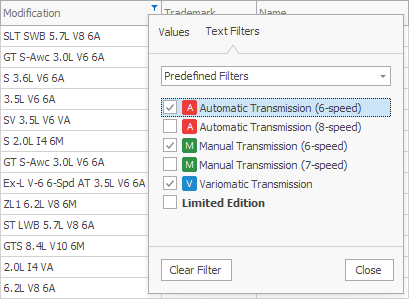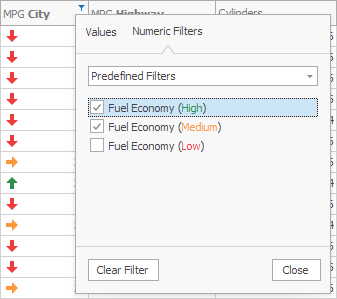ColumnView.FilterPopupExcelData Event
Allows you to add, remove, and modify data values and customize predefined filters in the Excel style pop-up filter menus. Filter items added manually on this event must be unique and sorted.
Namespace: DevExpress.XtraGrid.Views.Base
Assembly: DevExpress.XtraGrid.v24.2.dll
NuGet Packages: DevExpress.Win.Grid, DevExpress.Win.Navigation
Declaration
[DXCategory("Behavior")]
public event FilterPopupExcelDataEventHandler FilterPopupExcelDataEvent Data
The FilterPopupExcelData event's data class is FilterPopupExcelDataEventArgs. The following properties provide information specific to this event:
| Property | Description |
|---|---|
| Column | Gets the column being processed. Inherited from ExcelFilteringDataEventArgs<TColumn>. |
| DataItems | Provides access to the collection of data values by which the column being processed can be filtered, and the corresponding display texts. Inherited from ExcelFilteringDataEventArgs. |
| DisplayTexts | Provides acces to the collection of the texts to be displayed in the filter popup for the corresponding data values by which the column being processed can be filtered. Inherited from ExcelFilteringDataEventArgs. |
| FilterItems | Provides access to the collection of custom filter conditions by which the column being processed can be filtered. Inherited from ExcelFilteringDataEventArgs. |
| HtmlImages | Gets or sets a collection of images to be inserted into filter item captions using HTML tags. This property is in effect when the HTML formatting feature is enabled for filter item captions. Inherited from ExcelFilteringDataEventArgs. |
| ImageAlignment | Gets or sets the alignment of images fetched from the column’s image combo box editor to the filter menu. For internal use. Inherited from ExcelFilteringDataEventArgs. |
| Images | Provides access to the collection of images fetched form the column’s image combo box editor to the filter menu. For internal use. Inherited from ExcelFilteringDataEventArgs. |
| IsInitialized | Gets whether these event arguments contain data values. Inherited from ExcelFilteringDataEventArgs. |
| IsNotLoaded | Gets or sets whether the data is not yet loaded during asynchronous data loading. Inherited from ExcelFilteringDataEventArgs. |
| Values | Provides access to the collection of data values by which the column being processed can be filtered. Inherited from ExcelFilteringDataEventArgs. |
The event data class exposes the following methods:
| Method | Description |
|---|---|
| AddData(Object, String, Boolean) | Adds the specified data value by which the column being processed can be filtered, and the corresponding text to be displayed in the filter popup. Inherited from ExcelFilteringDataEventArgs. |
| AddFilter(String, CriteriaOperator, Boolean) | Adds the specified filter condition by which the column being processed can be filtered, and the corresponding text to be displayed in the filter popup. Inherited from ExcelFilteringDataEventArgs. |
| AddFilter(String, String, Boolean) | Adds the specified filter condition by which the column being processed can be filtered, and the corresponding text to be displayed in the filter popup. Inherited from ExcelFilteringDataEventArgs. |
| ChangeText(Object, String) | Changes the display text in the filter popup for the specified data value. Inherited from ExcelFilteringDataEventArgs. |
| ClearData() | Removes all items from the collection of data values by which the column being processed can be filtered. Inherited from ExcelFilteringDataEventArgs. |
| GetDisplayTexts() | Returns an array of strings representing captions for filters in the popup. Inherited from ExcelFilteringDataEventArgs. |
| GetFilterItems() | Returns the collection of custom filter conditions by which the column being processed can be filtered. Inherited from ExcelFilteringDataEventArgs. |
| GetValues() | Returns an array of objects representing data values by which the column being processed can be filtered. Inherited from ExcelFilteringDataEventArgs. |
| RemoveData(Object) | Removes the specified data value by which the column being processed can be filtered from the filter popup. Inherited from ExcelFilteringDataEventArgs. |
Examples
The following code snippet shows how to handle the FilterPopupExcelData event to add custom filters for particular columns.


![]](/WindowsForms/images/columnview_filterpopupexceldata2134309.png)
void gridView_FilterPopupExcelData(object sender, FilterPopupExcelDataEventArgs e) {
string fieldName = e.Column.FieldName;
if(e.Column == bcModification) {
// Add predefined filters to the Filters tab.
e.AddFilter("<image=A><nbsp>Automatic Transmission (6-speed)", "Contains([" + fieldName + "], '6A')", true);
e.AddFilter("<image=A><nbsp>Automatic Transmission (8-speed)", "Contains([" + fieldName + "], '8A')", true);
e.AddFilter("<image=M><nbsp>Manual Transmission (6-speed)", "Contains([" + fieldName + "], '6M')", true);
e.AddFilter("<image=M><nbsp>Manual Transmission (7-speed)", "Contains([" + fieldName + "], '7M')", true);
e.AddFilter("<image=V><nbsp>Variomatic Transmission", "Contains([" + fieldName + "], 'VA')", true);
e.AddFilter("<b>Limited Edition</b>", "Contains([" + fieldName + "], 'Limited')", true);
// Customize filter values in the Values tab.
foreach(var item in e.DataItems) {
if(item.Text.Contains("V6"))
item.HtmlText = item.Text.Replace("V6", "<b>V6</b>");
if(item.Text.Contains("V8"))
item.HtmlText = item.Text.Replace("V8", "<b>V8</b>");
if(item.Text.Contains("Limited"))
item.HtmlText = "<image=Ltd><nbsp>" + item.Text;
}
}
if(e.Column == bcMPGCity) { // 12-28
e.AddFilter("Fuel Economy (<color=@Information>High</color>)", "[" + fieldName + "]>=25", true);
e.AddFilter("Fuel Economy (<color=@Warning>Medium</color>)", "[" + fieldName + "]>15 AND [" + fieldName + "]<25", true);
e.AddFilter("Fuel Economy (<color=@Critical>Low</color>)", "[" + fieldName + "]<=15", true);
}
if(e.Column == bcMPGHighway) { // 15-36
e.AddFilter("Fuel Economy (<color=@Information>High</color>)", "[" + fieldName + "]>=20", true);
e.AddFilter("Fuel Economy (<color=@Warning>Medium</color>)", "[" + fieldName + "]>20 AND [" + fieldName + "]<30", true);
e.AddFilter("Fuel Economy (<color=@Critical>Low</color>)", "[" + fieldName + "]>=20", true);
}
if (e.Column == bcName) {
// Add a custom filter value and its caption to the Values tab.
e.AddData("Q5", "<b>Q5</b>", true);
// Change the caption of an existing filter value.
e.ChangeText("Beetle", "Coccinelle");
// Remove a particular filter value.
e.RemoveData("Touareg");
// You can also change filter properties according to a custom logic.
foreach (var item in e.DataItems) {
item.Text = item.Text.ToUpper();
}
}
}
Note
Run Excel Style Filtering module in the XtraGrid MainDemo to see the complete example.
A default column filter menu contains data values available in the column. The code below shows how to populate a filter menu with custom values.

Note
The example uses the grid control. The vertical grid, tree list, and pivot grid controls provide a similar API.
In this example, the processed column contains comma-separated values that can be treated as individual tokens. The FilterPopupExcelData event allows you to populate the menu with custom tokens instead of the available data values.
readonly static char[] separators = new char[] { ',', ' ' };
void OnFilterPopupExcelData(object sender, FilterPopupExcelDataEventArgs e) {
// Create a collection of tokens based on data values.
var tokens = new HashSet<string>();
for(int i = 0; i < e.Values.Length; i++) {
var parts = ((string)e.Values[i]).Split(separators, StringSplitOptions.RemoveEmptyEntries);
for(int j = 0; j < parts.Length; j++)
tokens.Add(parts[j]);
}
// Remove the default data values from the filter menu.
e.ClearData();
// Populate the menu with the created tokens.
foreach(string t in tokens.OrderBy(x => x))
e.AddData(t, t);
}
If you have populated the menu with custom tokens, you also must handle the following events:
FilterPopupExcelQueryFilterCriteria — to convert the selected tokens to the corresponding filter criteria that should be applied to data (direct conversion). This conversion is processed when the user selects a token in the menu/applies the selected tokens/closes the menu.
void OnFilterPopupExcelQueryFilterCriteria(object sender, FilterPopupExcelQueryFilterCriteriaEventArgs e) { var viewModel = e.Value as ICollectionValueViewModel<string>; var property = new OperandProperty(e.Path); var functions = viewModel.Values .Select(x => new FunctionOperator(FunctionOperatorType.Contains, property, x)); e.FilterCriteria = CriteriaOperator.Or(functions); }FilterPopupExcelParseFilterCriteria — to convert the applied filter criteria to the corresponding tokens that should be selected in the menu (reverse conversion). This conversion is processed when the user opens the menu.
void OnFilterPopupExcelParseFilterCriteria(object sender, FilterPopupExcelParseFilterCriteriaEventArgs e) { var func = e.FilterCriteria as FunctionOperator; if(!ReferenceEquals(func, null)) e.SetValue(((OperandValue)func.Operands[1]).Value); var group = e.FilterCriteria as GroupOperator; if(!ReferenceEquals(group, null)) { var values = group.Operands .OfType<FunctionOperator>() .Select(x => ((OperandValue)x.Operands[1]).Value); e.SetValues(values.ToArray()); } }